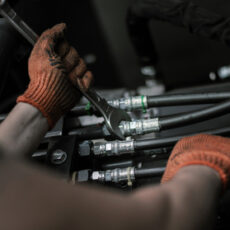 Hydraulic hoses play a crucial role in the smooth functioning of various machinery and equipment. From construction machinery to agricultural equipment, they are an essential component that helps in transmitting fluid power within different parts of a system. However, like any other component, hydraulic hoses require regular maintenance to ensure optimal performance and longevity. In this blog post, we will discuss some key tips for prolonging the lifespan of hydraulic hoses through proper maintenance practices.
Hydraulic hoses play a crucial role in the smooth functioning of various machinery and equipment. From construction machinery to agricultural equipment, they are an essential component that helps in transmitting fluid power within different parts of a system. However, like any other component, hydraulic hoses require regular maintenance to ensure optimal performance and longevity. In this blog post, we will discuss some key tips for prolonging the lifespan of hydraulic hoses through proper maintenance practices.
Understanding the Importance of Hydraulic Hose Maintenance
Before delving into maintenance tips, it is essential to understand why proper maintenance of hydraulic hoses is crucial. Hydraulic hoses are subject to high pressure, extreme temperatures, and continuous movement, which can lead to wear and tear over time. Regular maintenance helps in identifying any potential issues, such as leaks or cracks, before they escalate, resulting in costly repairs or downtime. By following proper maintenance practices, you can ensure the longevity and efficiency of your hydraulic hoses, thereby extending the lifespan of your equipment.
Inspecting Hydraulic Hoses Regularly
One of the most critical aspects of hydraulic hose maintenance is regular inspection. Visually inspecting the hoses for any signs of wear, abrasion, leaks, or damage is essential to identify potential issues early on. Check for any visible cracks, bulges, or signs of leakage, as these are indicators of a failing hose. It is also crucial to examine the hose fittings and connections for tightness and leaks. By conducting regular inspections, you can address any minor issues before they escalate into major problems, thus prolonging the lifespan of your hydraulic hoses.
Replacing Worn Out Hoses
Despite regular maintenance, hydraulic hoses will eventually wear out over time due to continuous use and exposure to harsh conditions. It is important to replace worn-out hoses promptly to prevent any potential failures or accidents. Look for any signs of damage or deterioration, such as cracks, bulges, or leaks, and replace the hose immediately if any issues are detected. Using worn-out hoses can lead to hydraulic fluid leakage, loss of pressure, and equipment failure, so timely replacement is crucial to ensure the safety and efficiency of your equipment.
Proper Storage of Hydraulic Hoses
In addition to regular inspection and replacement, proper storage of hydraulic hoses is essential for maintaining their longevity. Store hoses in a clean, dry, and well-ventilated area to prevent exposure to moisture, dirt, or extreme temperatures. Avoid storing hoses directly on the ground or in areas where they can be easily damaged by heavy equipment or sharp objects. Proper storage not only prolongs the lifespan of hydraulic hoses but also ensures that they are in optimal condition when needed for use.
Avoiding Twisting and Kinking
When installing or routing hydraulic hoses, it is important to avoid twisting, kinking, or bending them beyond their minimum bend radius. Twisting or kinking can lead to internal damage or blockages within the hose, resulting in reduced flow or pressure. Use proper tools and fittings to ensure that hoses are installed correctly and securely without any twists or kinks. Proper installation not only prolongs the lifespan of hydraulic hoses but also ensures efficient fluid transmission within the system.
Using the Right Hydraulic Fluid
Using the correct hydraulic fluid is crucial for maintaining the longevity of your hydraulic hoses. Make sure to use fluid that is compatible with the hose material and system requirements to prevent any degradation or damage. Check the manufacturer’s recommendations for the type of hydraulic fluid to be used and avoid mixing different types of fluids, as this can lead to chemical reactions and damage to the hoses. Using the right hydraulic fluid not only extends the lifespan of hoses but also ensures optimal performance and efficiency of your equipment.
Training and Education for Maintenance Personnel
Lastly, providing proper training and education to maintenance personnel is essential for ensuring the longevity of hydraulic hoses. Make sure that staff members are trained in proper maintenance practices, including inspection, replacement, and storage of hydraulic hoses. Educate them on the importance of regular maintenance and the potential risks of neglecting proper maintenance procedures. By investing in training and education for maintenance personnel, you can ensure that hydraulic hoses are well-maintained and operating efficiently, thereby prolonging the lifespan of your equipment.
Summary
Proper maintenance of hydraulic hoses is essential for ensuring the longevity and efficiency of your equipment. By following these tips, including regular inspection, timely replacement, proper storage, avoiding twisting and kinking, using the right hydraulic fluid, and providing training for maintenance personnel, you can prolong the lifespan of your hydraulic hoses and prevent costly repairs or downtime. Remember that proper maintenance is key to the smooth functioning of your machinery and equipment, so make it a priority to keep your hydraulic hoses in top condition.
Got Questions About Industrial Machinery? Let Us Help!
Hydraulic Power Sales, Inc. is local manufacture, distributor, and service provider of hydraulics equipment based in Cordova, California. Since 1985, we have been providing hydraulic repair services, hose assemblies, and sales to businesses throughout northern California. We manufacture hydraulic engine systems and hydraulic cylinders while supplying other hydraulic equipment. We want to be your one source for all of your hydraulic/pneumatic needs. Give us a call today!

